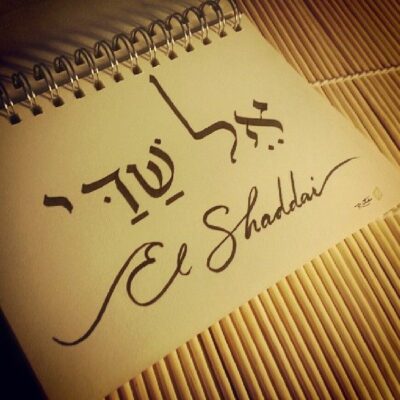A few weeks back I was asked a question about a prayer by one of the offenders I meet with at a nearby prison. We have been studying together for a couple of years now, and meet every other week in the prison chapel for a Messianic service where we use a Siddur to go through a liturgy, sing some worship songs together and read the weekly Torah, Haftarah and New Testament portions. My friend wanted to know how to say “I love you, Lord” in Hebrew when he prayed.
Resources are limited for these incarcerated men and I am frequently asked questions like this. Many of them – perhaps most of them – I am unable to answer with total certainty on the spot. While I do have more than adequate resources on which I may have become too dependent, I am unable to take them with me when I go into the facility. I had to tell my friend that I would find the answer and get back with him.
Love
When I got back home, I did an internet search for “I love you” in Hebrew. As I might have guessed, there are multiple ways to say this depending on the context and who is being addressed. Most all of what I found was, as I expected, based on the Hebrew word ahav. But I needed to be sure I was using the proper parsing.
When I want to be absolutely certain of the correct phrasing for a prayer, blessing or song in Hebrew, I often search for the words in Scripture. So using my Bible software programs, I did a search for a number of variations on the phrase, “I love you, Lord.” I came up with only one instance anywhere in the Bible:
“I love You, O LORD, my strength” (Psalms 18:1).
But when I checked the Hebrew text, I did not find the word ahav. Instead, the Psalmist used the word racham. My software tells me this is in the imperfect tense, Qal stem. Here is the definition of this word from Brown-Driver-Briggs Hebrew Lexicon:
H7355 רחם râcham
1) to love, love deeply, have mercy, be compassionate, have tender affection, have compassion
1a) (Qal) to love
The imperfect tense, first person singular action (I love) with a second person singular object (I love you) is a single word in Hebrew, transliterated in Psalm 18:1 as ’erchamªcha.
I knew when I discovered this that I had heard that word before, but I did not remember where. I wrote down what I had found to give to my friend.
Preparing for Sabbath
This past week I was making preparations for the home fellowship group my wife and I were hosting on Sabbath. I selected a few songs taken from the week’s Portion readings, and then went browsing my collection for other songs that might seem appropriate for the worship time. Among those was a song by Michael Card from back in the 1980s, El Shaddai. I had thought about it from time to time but hadn’t yet sung it in our home fellowship group meetings.
I listened to a recording of El Shaddai, and there was the word! Not just the word, but the whole phrase my friend wanted to pray. I pulled out an old songbook just to make sure. The transliteration was spelled a little differently, but it was the same word:
El Shaddai, El Shaddai, erkamka na Adonai
(God Almighty, God Almighty, I love you, Lord)
A Heart’s Desire Given
Our next service in the prison would be on Friday, the day before I would use this song in our Sabbath home fellowship worship time. I quickly printed out the lyrics so that I could show them to my friend and we could sing this beautiful song during our service. What happened next is truly an amazing display of our Father’s love toward his children.
Delight yourself in the LORD;
And He will give you the desires of your heart.
(Psalm 37:4)
My friend plays guitar and bass and sings on the worship team in the prison chapel. He was familiar with the song El Shaddai, and told me that he had been singing it in his private devotion time the past week or so, for no particular reason other than he liked the song and felt compelled to sing it. He knew the meaning of most of the Hebrew words in the song – El Shaddai (God Almighty), El Elyon (God Most High), and Adonai (Lord, often used in place of the Divine Name, Yahweh). But he did not know the meaning of the word erkamka. Not until now.
I assured my friend that he was not singing El Shaddai, El Shaddai, erkamka na Adonai “for no particular reason.” His desire was to pray, in Hebrew, the words “I love you, Lord.” The Ruach HaKodesh – the Holy Spirit – had granted him the desire of his heart even before I could give him the answer to his question.


Yeshua Ani Ohev Otcha
Jesus I Love You
I was speaking to Yah and was asking Him the same question this morning. Your page was one of the links that came up. And I love this song El Shaddai. Wow what a revelation. Praise be to Yahuah Elohiym. Thanks and Yah bless you.
This was a heartfelt antidote. Thank you Sir for sharing it.
I’m in tears. Baruch HaShem! How beautiful!